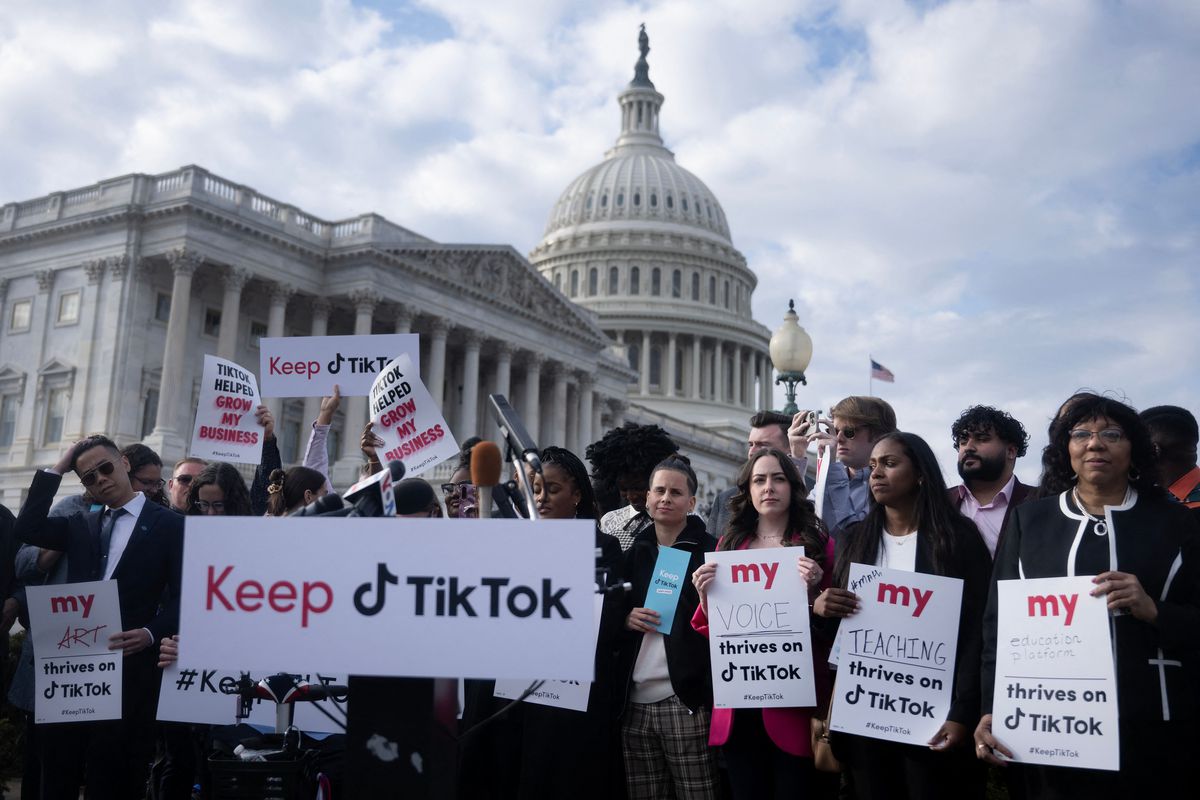
Amidst both pressing domestic and global challenges, the U.S. Congress finds itself embroiled in a debate to effectively ban the China-owned video app, TikTok.
Washington policymakers seem to harbor a belief that a platform showcasing playful antics threatens the future of the free world. A government built on free speech might shut down a cell phone favorite used by an estimated 170 million Americans.
The campaign demonstrates the unreasoning fear surrounding the People’s Republic of China. Far worse than the picture of conquering armies apparently is the specter of an electronic program dominating the minds of Americans. In a bitterly contested election year, Congress is determined to score political points.
In March the House overwhelmingly passed the “Protecting Americans from Foreign Adversary Controlled Applications Act”—the sort of clunky name one would have expected from the Chinese Communist Party. The measure is aimed at TikTok, though it would apply to any “foreign adversary controlled application.” TikTok could avoid being banned if sold by its parent company, ByteDance, within six months.
The primary losers from a ban would be average folks who enjoy watching funny videos, but a range of businesses would be affected as well. Although advertising alternatives exist, they may be limited and smaller firms likely would be disproportionately harmed. (Ironically, the Biden presidential campaign is using TikTok even as the president says he would sign a ban.)
Moreover, the legislation would reduce digital competition, otherwise a concern of many of the same people leading the current charge. Escalating the tech war against Beijing also would encourage retaliation against U.S. providers. Nina Xiang of TH Capital warned: “the proposal serves as an unmistakable sign that a new era of economic warfare has begun and that markets previously wide open to free competition could snap shut overnight.”
Three main arguments have been advanced for excluding TikTok. The first is that it is a trashy app that degrades American culture and ruins Americans’ attention spans. Probably true, but that’s no reason for a legal ban. If it was, legions of federal legislators would have to wield buzzsaws to TV, radio, print, and online content of all sorts. Political advertising and commentary also would warrant stringent federal oversight.
Moreover, who would trust the current crew in Washington with deciding what Americans should watch, read, and experience? The mind boggles at the thought. Especially with legislation rushed through amid a bitter presidential and congressional campaign. The likelihood that such a measure would improve anything, let alone public life, is miniscule. Even if TikTok is sold, the platform is likely to be as socially counterproductive as ever.
More serious is the second charge, that TikTok collects personal data and could transfer it to the Chinese government. There is no proof that it has done so, despite some admitted privacy breaches. The company has created data storage and protection procedures, most notably “Project Texas,” intended to protect its users’ privacy. However, there is significant doubt over the effectiveness of these measures since nothing can prevent the Beijing government from demanding compliance from Chinese companies. Hence, promises from TikTok, even if sincere, offer little protection.
However, TikTok use is voluntary, just like U.S. and other foreign digital enterprises. Indeed, American technology firms, such as Facebook, collect and sell more data than that accumulated by TikTok. The PRC almost certainly could get whatever information that it wants elsewhere.
That said, some people might want to avoid TikTok and any other social media company which collects personal data, especially locations, contacts, and biometrics. For instance, those who have emigrated to escape repression in their home country and are being pursued by the authorities probably shouldn’t be on TikTok—or Facebook. But their travails do not warrant banning a service used by the majority of Americans.
The third complaint is that TikTok manipulates information to promote hostility and division in America. Nearly one-third of under 30-year-olds say they get news from TikTok, but it is difficult to judge the impact on their thinking. Overt propaganda is unlikely to attract or convince members. TikTok gains when it provides the kind of stories that readers want. Moreover, digital alternatives to TikTok might prove no better. On or offline, bad news gets more views, clicks, and listens than good news.
Nor are those making these allegations disinterested. Although some people complain that the mainstream media understated the Gaza war’s cost, some House members explicitly attacked TikTok for reporting on the damage and casualties caused by Israel’s assault on Gaza. Those charging TikTok with bias themselves may be biased.
Ultimately, it seems unlikely that TikTok has a significant impact on the public’s understanding of important issues. The app has adjusted access to information to satisfy presumed political demands and the PRC apparently enlisted TikTok in past PR efforts. However, these campaigns have had no obvious impact on anyone. Far more consequential are the multitude of inaccurate, slanted, and malicious domestic sources of information. Toss in the propaganda spewed by other foreign governments attempting to influence U.S. policy. TikTok is unlikely to do much damage to a public square already squalid, ugly, and sometimes dangerous.
Although it is easy for partisan politicians to trash TikTok to win a few votes, a better argument should be required to divest 170 million Americans of an app which they enjoy. Xiang also observed that the legislation “marks a fresh pinnacle of American paranoia and xenophobia.” A ban would be especially harmful for America’s international reputation. Uncle Sam once was willing to take on the world. Today he fears comic videos!
Formulating U.S. policy toward China remains an enormous challenge, especially amid a bitter political campaign in which both sides are treating the PRC as a punching bag. However, legislators should try to put the nation’s interest first. Banning TikTok is a sign of weakness. There are better ways to defend America.